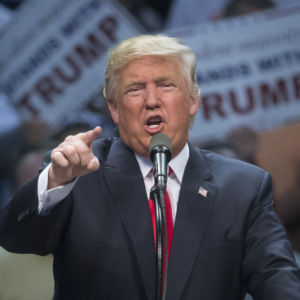President Donald Trump’s pick Monday to fill a vacant labor board seat is being praised by business groups that hope he will bring balance to the agency.
President Donald Trump has made workforce issues a critical component of his agenda. The National Labor Relations Board (NLRB) could play an important role since it oversees union and labor dispute cases. Trump announced his intent to nominate Marvin Kaplan to fill one of two remaining empty seats.
The NLRB is supposed to act as an independent judicial body for labor dispute cases. Critics contest the board is politically driven, with the issue becoming radically more pronounced during the last administration. They have argued the board overstepped its authority by unilaterally changing labor law through case precedent.
“We’ve worked with Marvin over the years and he will be a great addition to the NLRB,” Randy Johnson, senior vice president of labor and immigration at the U.S. Chamber of Commerce, told InsideSources. “He is balanced and thoughtful.”
Former President Barack Obama oversaw major changes to workplace regulations during his time in office. The NLRB became a critical player in implementing some of the changes. The business community has expressed particular concern over changes made to contracting, union elections, and micro-unions.
Kaplan is currently the chief counsel of the Occupational Safety and Health Review Commission. He previously served as counsel for the U.S. House Oversight and Government Reform Committee and then to the U.S. House Education and Workforce Committee.
“The National Restaurant Association is very pleased with President Trump’s selection of Marvin Kaplan as a nominee to the National Labor Relations Board,” Cicely Simpson, executive vice president of the National Restaurant Association, told InsideSources. “The NLRB will be deciding a number of important issues, including the joint employer standard and micro-unions, that directly impact small businesses.”
The NLRB made several changes during the last administration that the business community has fought. How union elections are held became one of the more contentious issues. Those opposed have called the change the “ambush election” rule because it shortens the amount of time union elections are held. The agency argued it was to streamline the process.
The NLRB also allowed unions to form a new type of bargaining unit known as micro-unions back in 2011. A micro-union focuses on a specialty group of employees instead of the entire workplace. Essentially, a union doesn’t need to get a majority vote to create a bargaining unit but rather win support within a subgroup of workers.
The International Franchise Association (IFA) noted particular concern over changes made to the joint-employer standard. The standard determines whether an employer is responsible for the employees and labor liabilities of a company it contracts with.
“A more sensible approach to labor policy will help make the American Dream more accessible to aspiring franchise owners,” IFA President Robert Cresanti said in a statement provided to InsideSources. “We are hopeful the Senate will swiftly confirm Kaplan and President Trump will quickly fill the remaining seat so they can restore balance and reason to a labor board that has tipped the scales against the needs of employers and employees for far too long.”
The joint-employer standard was previously determined based on whether a company had direct control over the employees of another business. That control could be over things like wages, the hiring process, or scheduling. The new standard looked at indirect control, which critics argue is too vague.
“While this appointment is an important step by the Trump Administration, only Congress can truly solve the web of confusion created by the actions of the previous Board on the joint employer issue,” Cresanti said. “We are hopeful both sides of the aisle can work together to help get our businesses back on track.”
Employers take on a lot of legal burdens and costs when they become joint-employers. The NLRB brought about the new standard by changing how it ruled on those cases. The Department of Labor (DOL), under the new administration, announced June 7 it will withdraw from the new standard.
The NLRB has argued the standard needed to be updated. The board has stated that the previous standard was outdated and was defined by conflicting case law. It notes a new standard needed to be applied that fits better in the current economic landscape.
Trump named Philip Miscimarra to serve as the chairman of the board April 24. Miscimarra was already a member and serving as the acting chairman. The Senate still needs to approve two more nominations before the administration gains majority control.
Trump has also managed to fill other appointments that are important to his economic agenda. Alexander Acosta being confirmed as labor secretary is one of the more critical appointments for businesses.
Trump also announced his intent Monday to nominate Patrick Pizzella to serve as the deputy secretary of labor.

